Key takeaways:
- Python’s simplicity and extensive libraries, like Pandas and NumPy, empower effective data analysis and visualization.
- Engagement in practical projects enhances coding skills and fosters a deeper understanding of data manipulation and real-world applications.
- Joining the Python community and leveraging resources like tutorials and forums helps overcome challenges and boosts confidence in learning.
- Emphasizing project-based learning and focusing on weaknesses through coding challenges are key strategies for mastering Python efficiently.
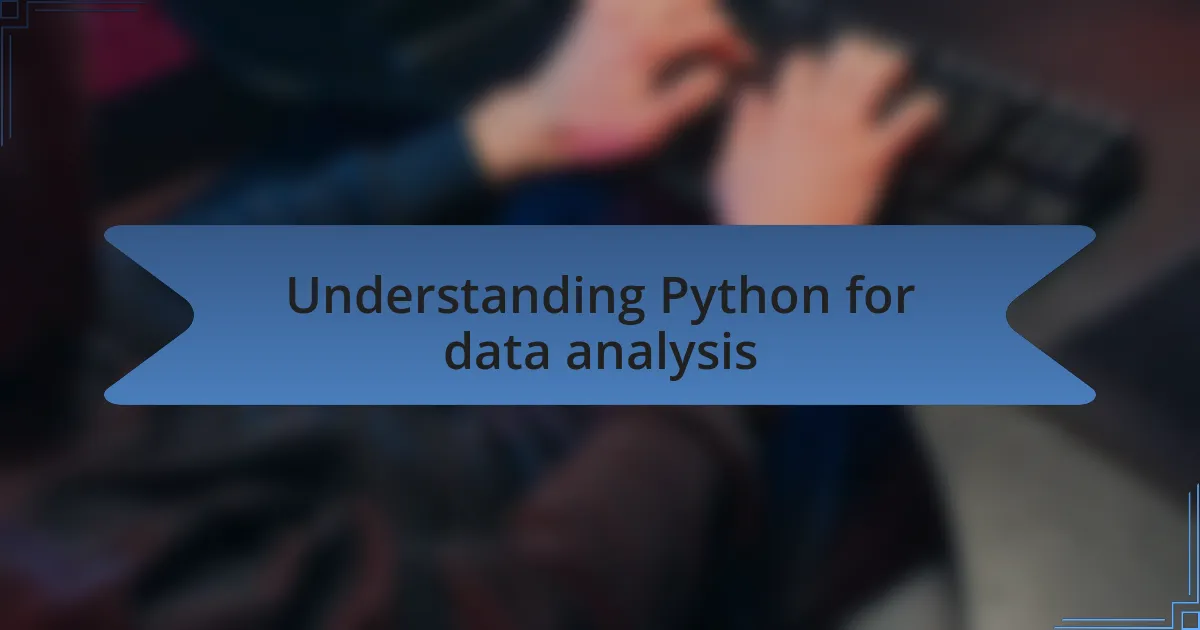
Understanding Python for data analysis
Python has become one of my go-to languages for data analysis, and I can tell you why. Its simplicity and readability make it perfect for someone who doesn’t want to drown in complex syntax. I remember the first time I graphed a dataset with just a few lines of code using Matplotlib; it felt like magic. Wouldn’t you agree that being able to visualize data so easily sparks a greater curiosity about trends and patterns?
Delving into libraries like Pandas was a game-changer for me. The way I could manipulate and analyze data in diverse formats was almost empowering. I distinctly recall tackling a messy dataset that seemed impossible at first. After some trial and error with Pandas functions like groupby() and pivot_table(), I found clarity amidst the chaos. Have you ever had that moment when everything suddenly clicks?
Moreover, what truly sets Python apart is its vibrant community. When I hit a wall, it was the online forums and tutorials that guided me back on track. I still remember posting a question about data cleaning techniques and being met with an outpouring of support and suggestions. Isn’t it inspiring to think that there’s a whole network of people eager to share their knowledge? This collaborative environment amplifies the learning process and keeps the excitement alive.
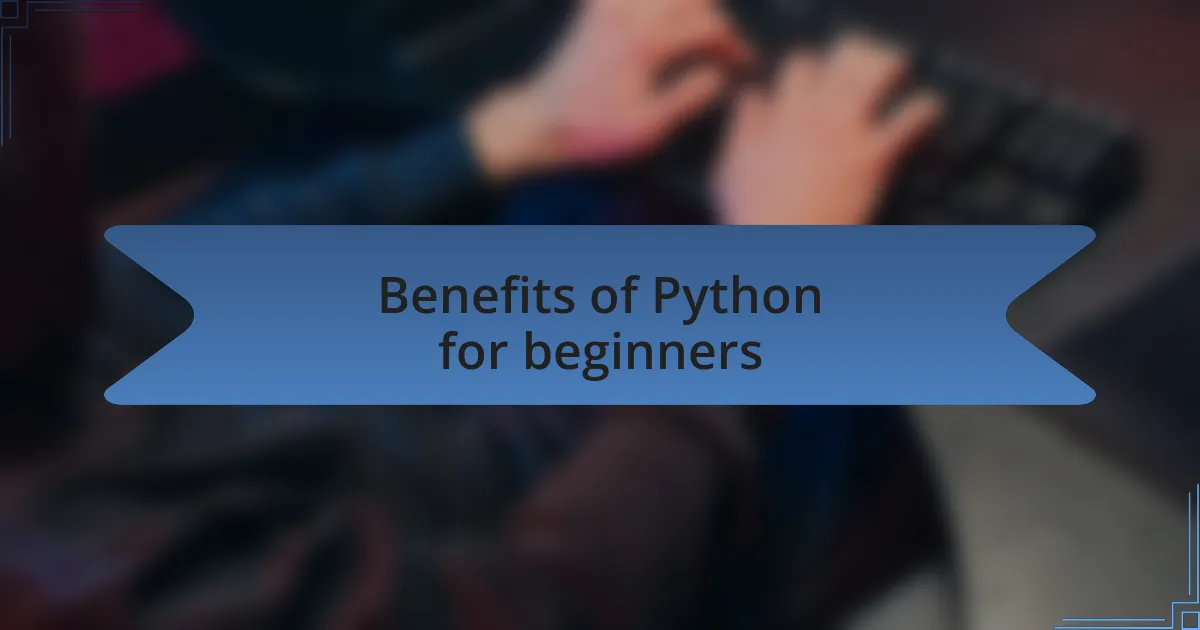
Benefits of Python for beginners
One of the standout benefits of Python for beginners is how quickly it allows you to start coding. I recall setting up my first Python environment; within minutes, I was running simple scripts. Isn’t it rewarding to see your code produce instant results? This immediate feedback loops can significantly boost your confidence, encouraging further exploration.
Another compelling aspect is the extensive array of libraries and tools at your fingertips. For instance, working with NumPy for numerical data felt liberating, particularly when I realized I could perform complex calculations effortlessly. I remember being astonished when a few lines of code transformed a daunting dataset into manageable insights. Have you ever experienced that moment when a tool just clicks, making everything seem possible?
Finally, the accessibility of resources for learning Python is unparalleled. If you’re like me, you appreciate a good tutorial or a friendly blog post that simplifies a tough concept. Each time I stumbled upon a clear explanation or a helpful video, I felt a surge of motivation. It’s amazing how connected and supported you feel when there’s an abundance of learning materials available, right? This supportive atmosphere makes diving into Python not just manageable, but truly enjoyable.
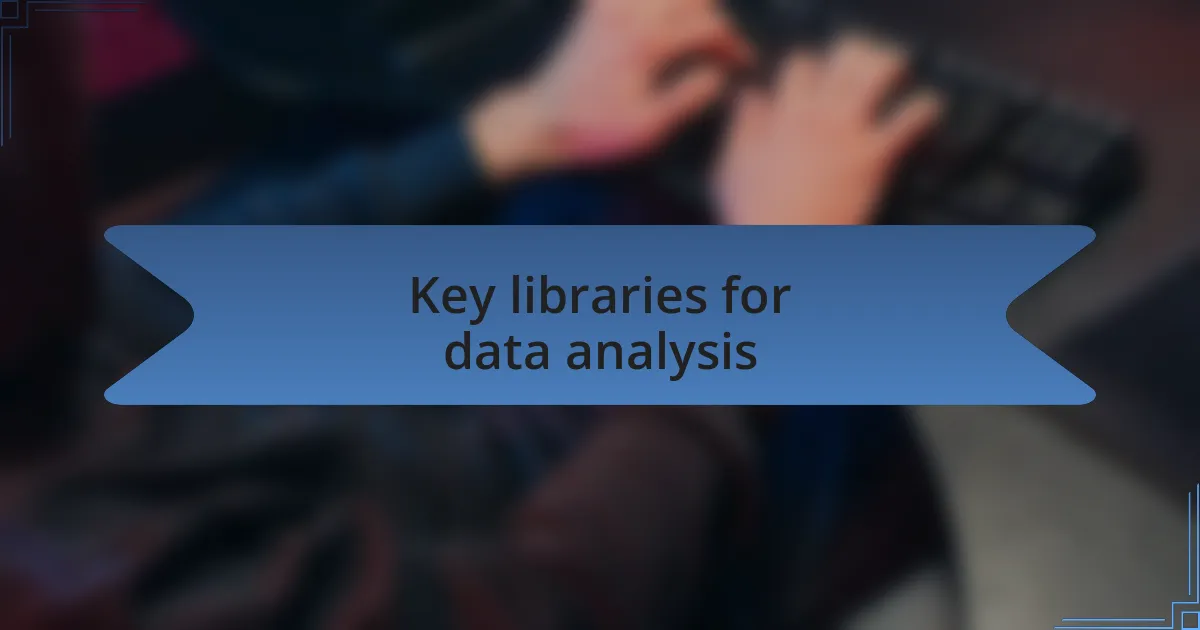
Key libraries for data analysis
When delving into data analysis with Python, a few libraries stand out: Pandas, NumPy, and Matplotlib. I distinctly remember the first time I encountered Pandas. It felt like discovering a hidden treasure; I could manipulate data frames with such ease. Have you ever marveled at how quickly you can transform and analyze data using just a few commands?
NumPy, on the other hand, turned my perception of data handling upside down. Working with arrays became a breeze, and I often found myself saying, “Why didn’t I start using this sooner?” Its ability to handle vast amounts of numerical data seamlessly was a game changer for my projects. If you’re grappling with performance issues, I can’t recommend it enough.
Then there’s Matplotlib, which brings data visualization to life. The first time I plotted a graph to illustrate trends, I felt like an artist painting a masterpiece. There’s something incredibly satisfying about seeing your data come alive visually. It’s not just about analyzing data; it’s about communicating insights effectively. Have you experienced that thrill when your visualizations resonate perfectly with your audience?
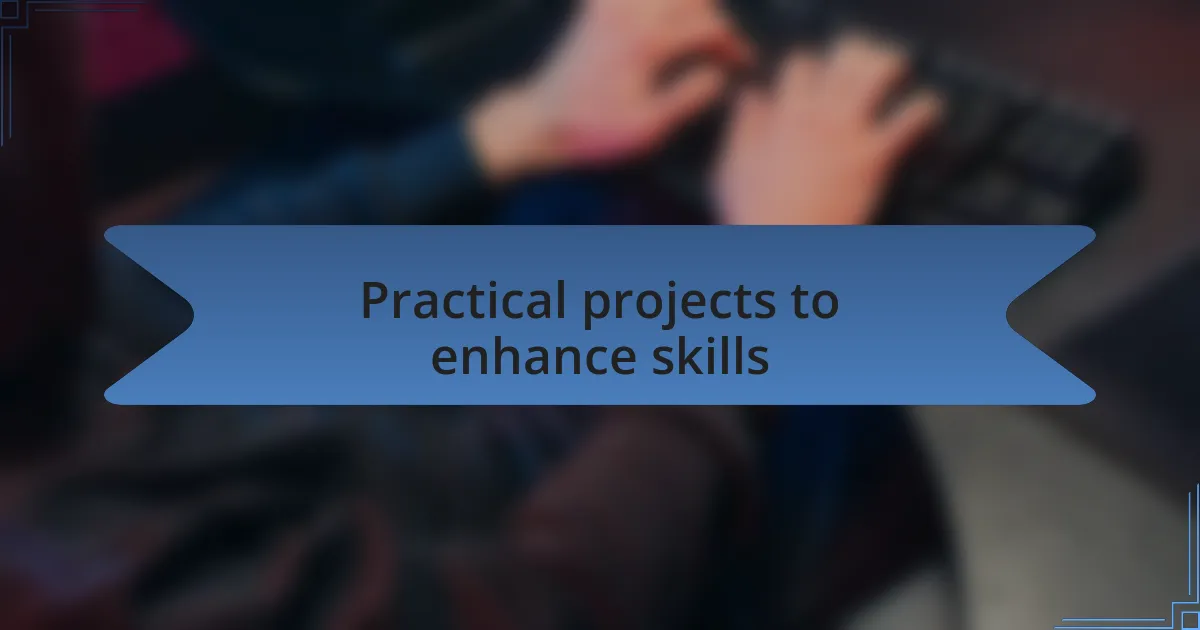
Practical projects to enhance skills
When I decided to enhance my Python skills, I jumped into practical projects that truly challenged me. One such project involved analyzing a public dataset on global temperature changes. The thrill of uncovering trends and anomalies kept me up late, and I was even inspired to share my findings with friends, sparking meaningful discussions about climate change. Have you ever felt that rush of excitement when your work not only educates you but also engages others?
I also tackled a personal finance tracker using Pandas. By designing custom functions to visualize my spending and analyze savings trends, I realized how practical projects can have a direct impact on daily life. There were moments when I watched my progress through graphs and thought, “Wow, I actually made that!” This experience not only sharpened my coding skills but also taught me the significance of data in making informed financial decisions.
Finally, contributing to open-source projects on GitHub not only enhanced my technical abilities but also presented networking opportunities I never expected. Collaborating with other developers helped me to tackle real-world problems and learn from the community. Have you considered how sharing your knowledge can lead to mutual growth? It’s a fantastic way to immerse yourself in the coding culture while refining your own skills.
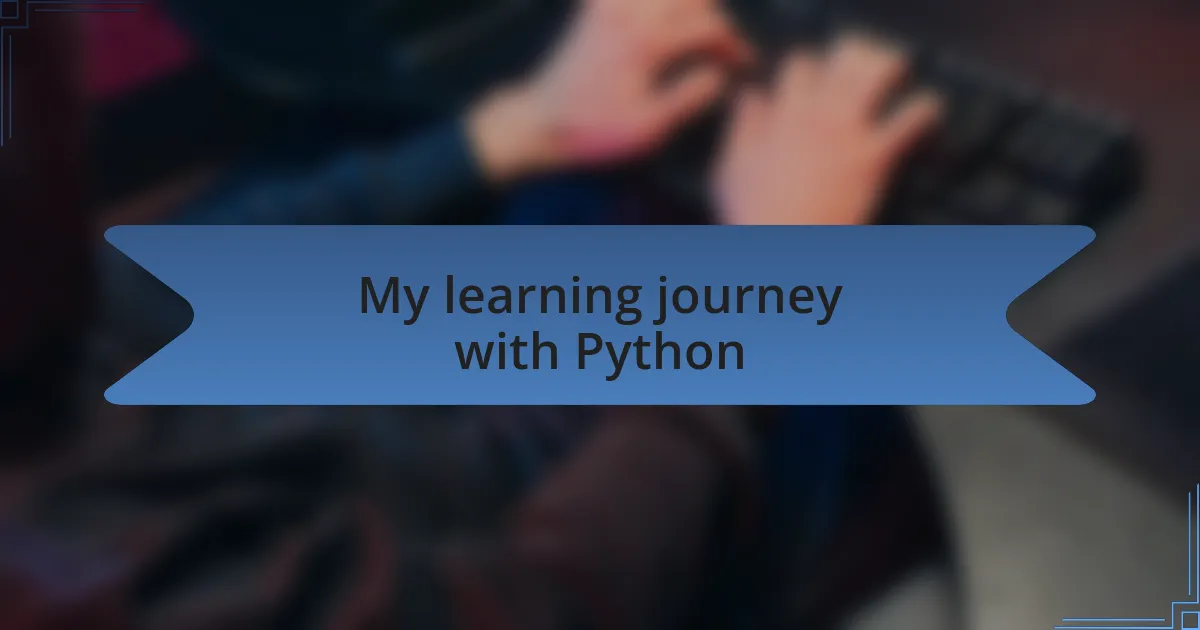
My learning journey with Python
My journey with Python started a bit hesitantly, as I was initially overwhelmed by the syntax and concepts. I remember one sleepless night, grappling with the difference between lists and tuples. It was frustrating, but when I finally understood how to use each effectively, it felt like a light bulb moment. Have you ever had a breakthrough like that? There’s nothing quite like the satisfaction of conquering a challenge that once seemed insurmountable.
As I delved deeper, I embraced the vast ecosystem of libraries available. The first time I utilized Matplotlib to create a simple data visualization, I was captivated by the way raw numbers could tell a story. I can still picture the moment when my scatter plot came to life, transforming data into a visual narrative. That was the moment I realized that Python wasn’t just a programming language; it was a tool for expressing insights and ideas creatively. Reflecting on this, I often wonder how many others miss out on this thrilling aspect of data analysis.
Building a portfolio of projects was crucial. Each project, whether it was a web scraper or a small machine-learning model, marked a significant step in my learning path. I vividly recall presenting my findings from a sentiment analysis on Twitter data. The mixture of nerves and excitement I felt while explaining my process was priceless. It made me think: how many opportunities are out there just waiting for us to grab them? Sharing my work not only boosted my confidence but also reinforced the importance of seeking feedback and continuing to learn.
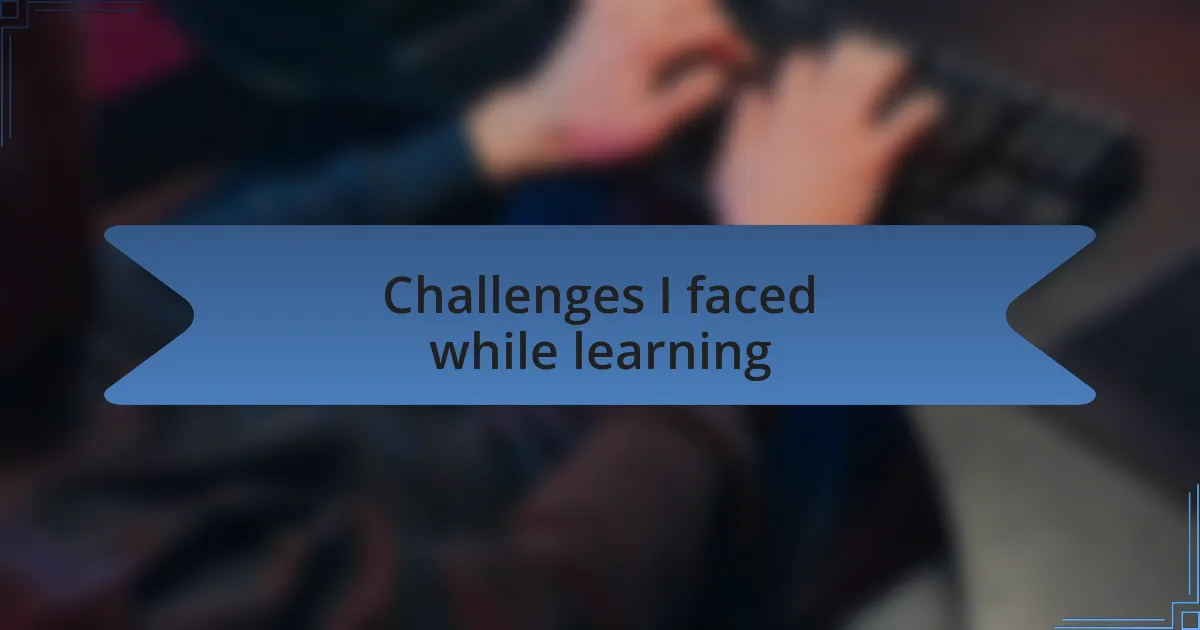
Challenges I faced while learning
One of the biggest challenges I encountered was mastering Python libraries. Libraries like Pandas and NumPy initially felt like foreign languages to me, and I often found myself staring blankly at the documentation. Have you ever felt lost in a sea of functions and methods? That moment of confusion is deeply familiar, yet pushing through it was key to unlocking the power of data manipulation and analysis.
Debugging was another hurdle that tested my patience. I distinctly remember a project where a single misplaced comma led to hours of frustration. The code seemed impeccable, but the error messages were cryptic. It made me question my progress: was I really cut out for this? However, each debugging session became a valuable lesson in resilience, teaching me to embrace mistakes as stepping stones rather than setbacks.
Lastly, the transition from theory to practical application was daunting. I often struggled to connect abstract concepts with real-world data problems. A pivotal moment for me was when I applied my theoretical knowledge to a project analyzing climate data. I was both nervous and excited, realizing that the academic exercises I completed were finally coming to life. Instead of seeing a wall, I began viewing these challenges as opportunities to innovate and grow. Have you ever experienced that shift in perspective? It’s transformative.
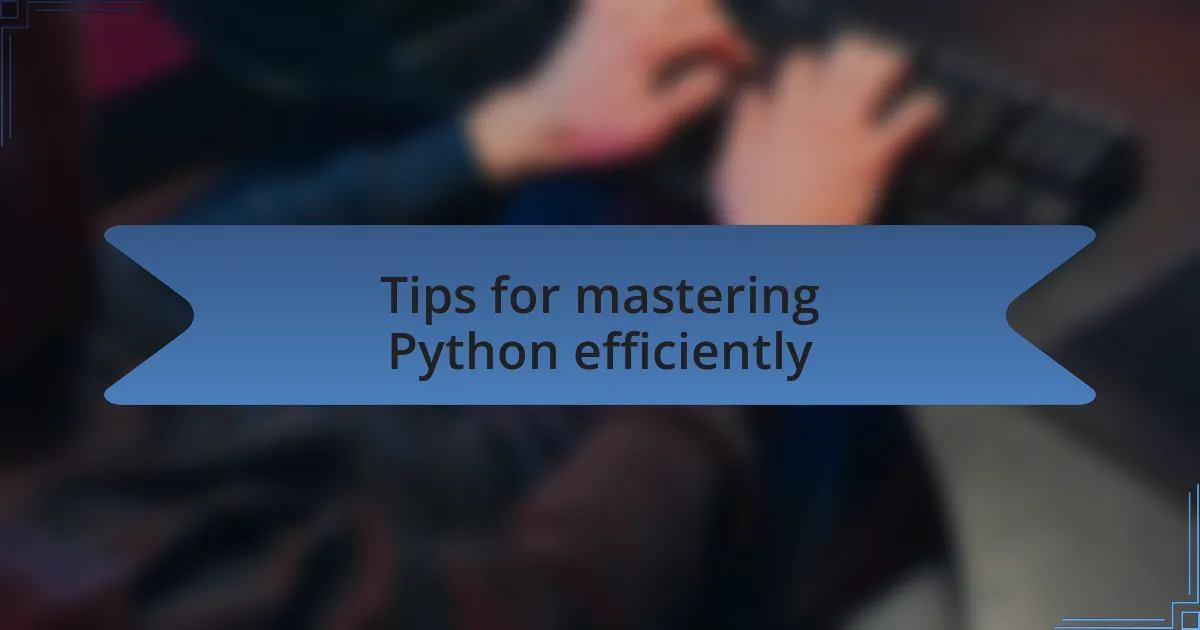
Tips for mastering Python efficiently
To master Python efficiently, one of the most beneficial strategies I discovered was embracing project-based learning. Instead of only reading books or completing online courses, I dove into personal projects that genuinely interested me. For instance, I decided to analyze a dataset related to my favorite sport, which helped me not only understand Python’s syntax but also see how to apply it in a context I was passionate about. Have you ever noticed how working on something you love can transform the learning experience? It makes all the difference.
Another effective tip is to regularly practice coding challenges that target your weaknesses. I remember struggling with string manipulation; it felt like a puzzle I couldn’t solve. So, I dedicated time each week to tackle problems on platforms like LeetCode and HackerRank. This approach allowed me to learn incrementally, finding joy in solving each challenge. What about you? Have you tried seeking out those specific weaknesses and turning them into strengths?
Lastly, connecting with the Python community has been invaluable. Early on, I joined forums and local groups where I could exchange ideas and ask questions. One unforgettable moment was when a fellow developer took the time to explain a complex concept to me in simpler terms. That experience reinforced the importance of teamwork in learning. Do you think sharing knowledge could enhance your understanding too? Engaging with others not only solidifies your knowledge but also builds a network that can guide you on your journey.